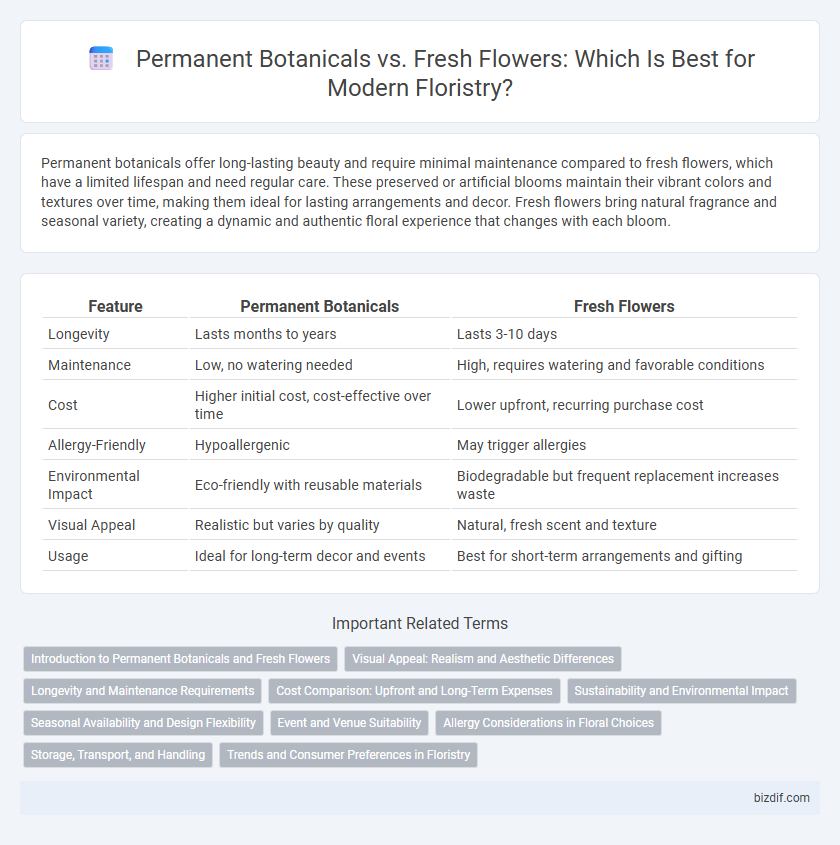Permanent botanicals offer long-lasting beauty and require minimal maintenance compared to fresh flowers, which have a limited lifespan and need regular care. These preserved or artificial blooms maintain their vibrant colors and textures over time, making them ideal for lasting arrangements and decor. Fresh flowers bring natural fragrance and seasonal variety, creating a dynamic and authentic floral experience that changes with each bloom.
Table of Comparison
| Feature | Permanent Botanicals | Fresh Flowers |
|---|---|---|
| Longevity | Lasts months to years | Lasts 3-10 days |
| Maintenance | Low, no watering needed | High, requires watering and favorable conditions |
| Cost | Higher initial cost, cost-effective over time | Lower upfront, recurring purchase cost |
| Allergy-Friendly | Hypoallergenic | May trigger allergies |
| Environmental Impact | Eco-friendly with reusable materials | Biodegradable but frequent replacement increases waste |
| Visual Appeal | Realistic but varies by quality | Natural, fresh scent and texture |
| Usage | Ideal for long-term decor and events | Best for short-term arrangements and gifting |
Introduction to Permanent Botanicals and Fresh Flowers
Permanent botanicals provide a long-lasting alternative to fresh flowers, crafted from materials like silk, preserved leaves, and dried blooms, retaining their visual appeal without wilting. Fresh flowers offer natural fragrance and vibrant colors but have a limited lifespan, requiring careful hydration and temperature control to maintain freshness. Choosing between permanent botanicals and fresh flowers depends on factors such as event duration, maintenance needs, and desired aesthetic longevity in floristry arrangements.
Visual Appeal: Realism and Aesthetic Differences
Permanent botanicals offer consistent visual appeal through lifelike textures and colors that resist wilting, providing lasting beauty ideal for long-term displays. Fresh flowers exhibit natural variations in color and form, contributing to a dynamic and vibrant aesthetic that can evoke a sense of freshness and vitality. Differences in realism are notable, as premium permanent botanicals replicate subtle details such as petal translucency and intricate veining, while fresh flowers naturally embody these organic characteristics.
Longevity and Maintenance Requirements
Permanent botanicals offer exceptional longevity, maintaining their aesthetic appeal indefinitely without the need for watering or sunlight, making them ideal for long-term displays. Fresh flowers provide natural fragrance and vibrant colors but require daily care, including watering, trimming, and proper temperature conditions to prolong their life, which typically spans only a few days to a week. Choosing between permanent botanicals and fresh flowers depends on the desired balance between maintenance effort and lasting visual impact in floral arrangements.
Cost Comparison: Upfront and Long-Term Expenses
Permanent botanicals require a higher upfront investment due to the cost of high-quality materials and craftsmanship, but they eliminate recurring expenses such as weekly flower purchases and refrigeration. Fresh flowers incur lower initial costs but lead to continuous expenses for replacement, storage, and maintenance, especially for large-scale events or installations. Over time, permanent botanicals offer significant savings by providing a reusable, durable alternative that minimizes waste and upkeep costs.
Sustainability and Environmental Impact
Permanent botanicals offer a sustainable alternative to fresh flowers by significantly reducing water consumption and eliminating the need for pesticides and fertilizers commonly used in floral agriculture. Fresh flowers generate considerable carbon emissions through transportation, refrigeration, and cultivation, whereas permanent botanicals, often made from recyclable or biodegradable materials, minimize waste and lower environmental impact over time. Choosing permanent botanicals supports eco-friendly practices by promoting longevity and reducing resource depletion associated with traditional floristry.
Seasonal Availability and Design Flexibility
Permanent botanicals offer year-round availability, eliminating the limitations of seasonal blooms and ensuring consistent design options regardless of natural growing cycles. Fresh flowers provide unique textures and scents tied to specific seasons, allowing for dynamic and authentic arrangements that highlight seasonal trends. Designers benefit from permanent botanicals' versatility and durability, while fresh flowers enhance creativity with their changing colors and shapes throughout the year.
Event and Venue Suitability
Permanent botanicals provide long-lasting elegance ideal for event venues requiring consistent decor without maintenance, such as hotels or conference centers. Fresh flowers offer vibrant, natural beauty with seasonal variety, best suited for weddings and short-term events where freshness enhances ambiance. Venue size, lighting, and event duration play crucial roles in choosing between permanent botanicals and fresh floral arrangements.
Allergy Considerations in Floral Choices
Permanent botanicals offer a hypoallergenic alternative to fresh flowers, minimizing pollen exposure and reducing the risk of allergic reactions for sensitive individuals. Unlike fresh flowers, which release pollen and fragrances that can trigger symptoms such as sneezing and itching, preserved botanicals maintain their beauty without aggravating allergies. Selecting permanent botanicals ensures long-lasting floral arrangements suitable for allergy sufferers while providing consistent aesthetic appeal.
Storage, Transport, and Handling
Permanent botanicals offer superior durability during storage, maintaining their appearance without water or climate control, unlike fresh flowers that require refrigeration and high humidity to stay vibrant. Transportation of permanent botanicals is more efficient due to their resistance to damage and lack of perishability, reducing the risk of wilting, crushing, or decay that often affects fresh flowers in transit. Handling permanent botanicals demands minimal care, eliminating the need for frequent watering or delicate treatment necessary for fresh flowers, which are prone to bruising and require gentle handling to preserve their lifespan.
Trends and Consumer Preferences in Floristry
Permanent botanicals are gaining popularity due to their longevity and low maintenance, aligning with eco-conscious consumer trends seeking sustainable decor options. Fresh flowers continue to appeal for their natural fragrance and vibrant appearance, preferred for special occasions and events that emphasize authenticity. Market data indicates a rising hybrid approach, combining preserved blooms with fresh arrangements to cater to diverse aesthetic preferences and durability demands.
Permanent Botanicals vs Fresh Flowers Infographic

 bizdif.com
bizdif.com